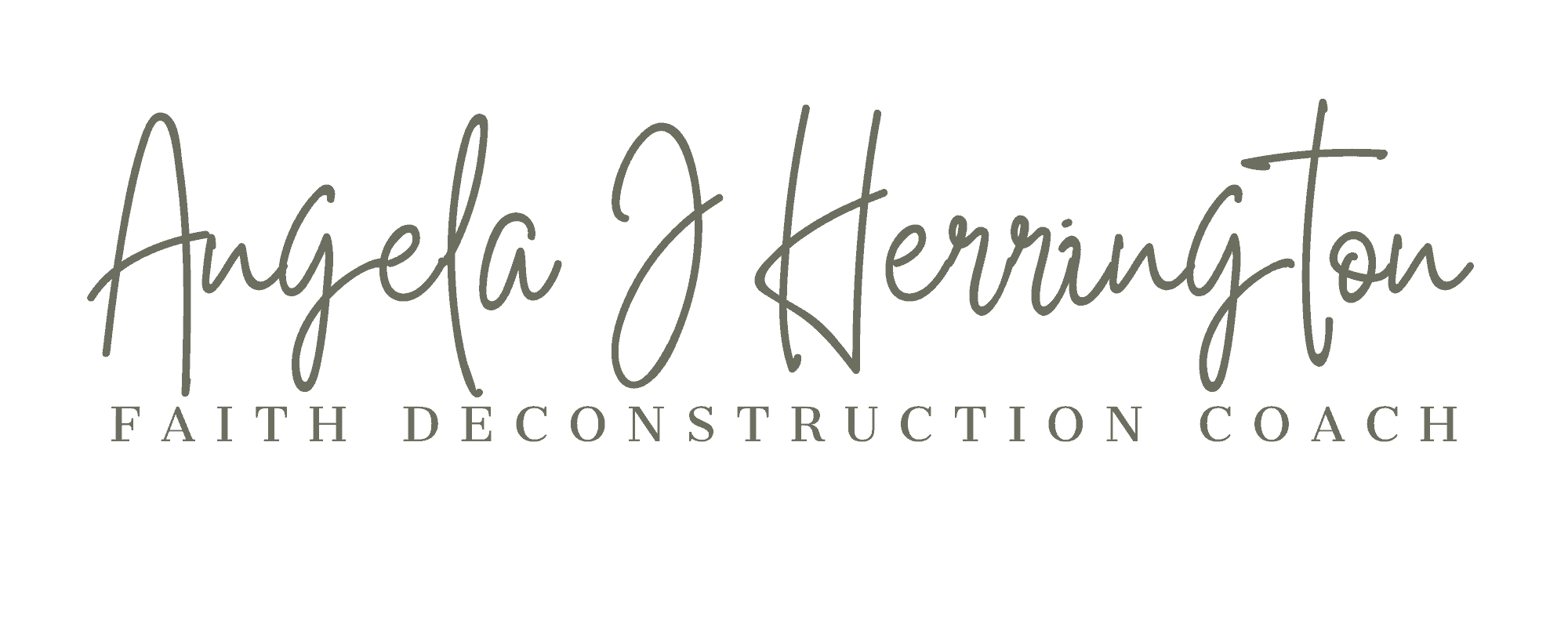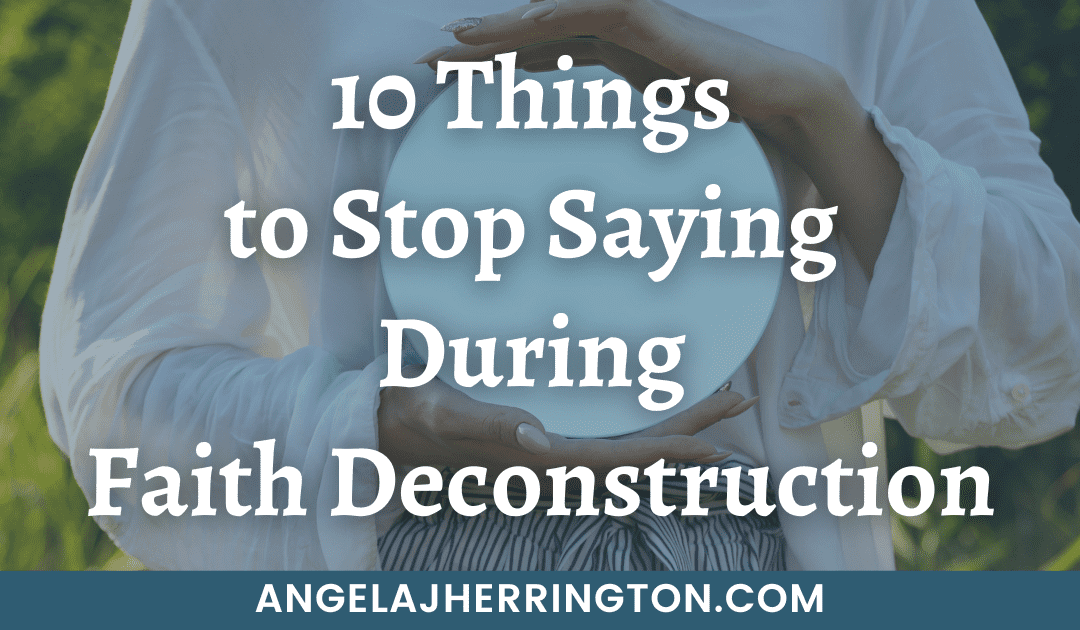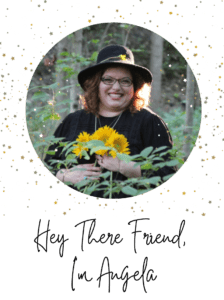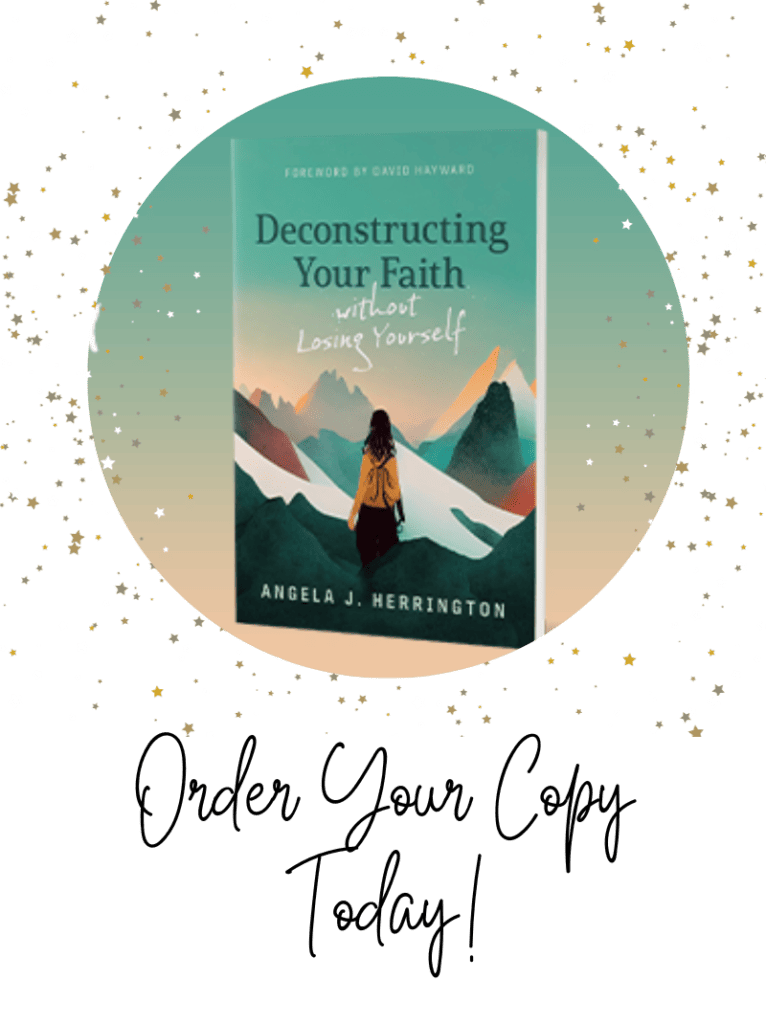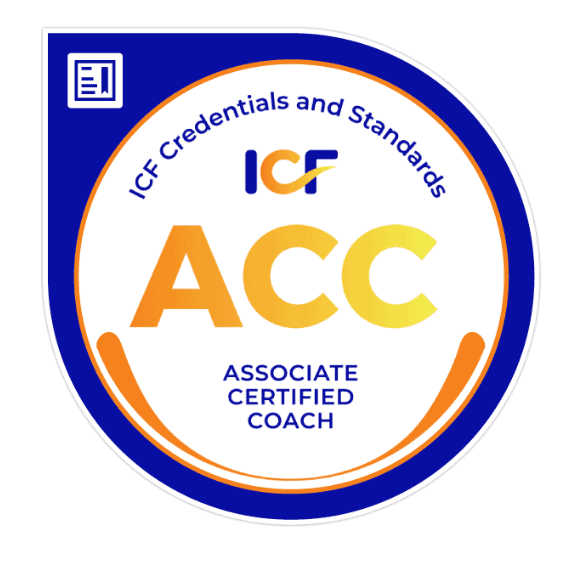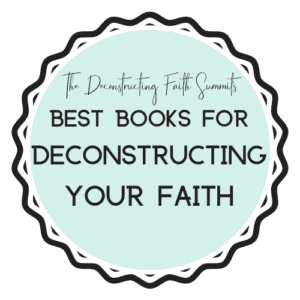During deconstruction, there are a lot of moving pieces, and a lot of beliefs are shifting, but we often forget to change how we talk to (and about) ourselves.
One of the most crucial things to shift your language away from the shame-based scarcity mindset of toxic religion and towards a spiritual life that nourishes you. But what if you can’t discern what shame-based scarcity rooted in toxic religion is versus what is rooted in spiritual freedom? Don’t worry, I’ve got you, my friend!
Here’s my top ten countdown of things to stop saying that will help you break away from toxic religion during the hardest parts of faith deconstruction.
Number 10: “I’ll never get through this faith deconstruction thing.”
No matter where you’re at a deconstruction, there’s a good chance it’s overwhelming, and I’m not going to lie, it can be tough to get through to the other side.
What’s important to know is that deconstruction is a lifelong process, just like faith, learning, or any other knowledge-based experience. So you don’t have to get to the other side of your faith deconstruction tomorrow.
Just because you’ll be doing this for a while, doesn’t mean it will be as hard as it is today. Instead of focusing on getting through, learn to hold space and care for yourself in the present moment.
So give yourself the space to be in deconstruction, feel everything you’re feeling, and keep the hope that it will not always be this way.
Number 9: “I’m the only one doing this.”
Walking away from a religious community you’ve been in for a very long time can make you feel like you’re the only one. And the way belonging is weaponized in the community exacerbates this. So when people reject you because you’re asking the ‘wrong questions’ or when your beliefs are starting to not align with your local church family, know that this is pretty common.
Sometimes it feels like you’re the only person who feels this way. But I promise you’re not.
I have felt similarly. Hundreds of people who have deconstructed their faith, perhaps 1000s of people, have felt that same sense of isolation across multiple denominations and religions. So here in the wilderness of faith deconstruction, there may be times when you’re on your own trying to figure out what feels true and what doesn’t. There are times whenn it’s good to be alone and times when it isn’t. I highly recommend joining an online community like my free Facebook group.
I pinky promise you’re not the only person asking these questions and navigating this challenging season and you can find a community that understands.
Number 8: “I’m going to make sure I don’t lose my faith during faith deconstruction.”
While it’s normal for people deconstructing their faith to feel like they want to hold on to it, you may end up changing deep beliefs that alter how your faith looks. It’s also typical for people to still have faith at the end of deconstruction, as much as others leave deconstruction without religious inclinations.
Setting out in the examination of your beliefs with the primary goal of preserving your faith limits your ability to ask questions without trying to control the answers. It’s like saying you’ll only go on a first date if you’re guanteed that the person you’re crushing on will be your forever life partner.
Holding onto your old way of doing faith is a way to keep one foot in the toxic religious community, where you probably have some level of privilege and acceptance. The goal of deconstruction is to plant both feet in a healthier space that encourages you to flourish, grow and not to use that privilege to harm other people.
The one thing I know to be true about trying to keep one foot in radically different communities is that it’s exhausting. If you try, it might work for a bit, but as you lean furthur into deconstruction, you’ll notice more and more conflict between the two spaces. Instead of that conflict being between you, and toxic religion, it’s between you and you, which is a battle that’s hard to win.
Releasing yourself from the pressure of preserving your faith as-is gives you a better chance of coming out the other side of your deconstruction with some faith intact, even if it looks radically different than the faith you had before.
Number 7: “I just need/want someone to tell me the right answers.”
Trust me, I hear you on this one. One of the most dangerous things about toxic religion and any other abusive system that hoards power is that there’s always a handful of people at the top of the food chain who dominate the story. They write the story and tell us what’s valuable, what’s not, what’s a threat, and what is helpful, and deconstruction challenges that.
So while you may want it to be easier, having someone to come in and tell you, “Hey, this is what to believe,” all that will do is throw you into another relationship where you trust other peopel’s opinion more than you’re own. It would be a devastating blow to your healing and shut down your deconstruction.
It’s time to learn how to trust yourself more than you trust those external voices. This is a season for choosing internal validation rather than responding to constant external pressures and trying to earn others’ approval. Listening to other people is adopting a different, perhaps slightly less toxic belief system but not learning to trust yourself, and learning how to flourish spiritually by leaning on your intuition.
So while it seems like it would be easier in the short run, it would be devastating in the long haul to have someone tell you what to believe and never learning how to choose what you want to believe.
Number 6: “I can’t do this faith deconstruction thing alone.”
So after reading the previous statement, you’re probably wondering if I’m saying that deconstruction is something that you have to do by yourself. It’s not, but you could if you had to. People are often shocked when I say this because I highly value community and see how supportive relationships can help us flourish.
But here’s the thing I want you to know. Even if you were the only person in the entire universe who was deconstructing and ended up on a desert island, all by yourself, you could do this on your own.
Remember, we’re not talking about adopting someone else’s belief system or allowing someone else to tell us what steps to take next. We’re talking about deconstructing as a way to reconnect with our Inner Knowing, reconnecting with this sense of something greater, and get away from the pre-packaged version of faith and spirituality. This means you can do this independently. Again, you don’t have to because there are lots of us out here who would love to support you.
Inside you is evrything you need to untangle from toxic religion, you just have to learn to listen and trust because you are your best faith deconstruction guide.
Number 5. “I wish I were better at sorting through my beliefs.”
It’s easy to be hard on yourself during faith deconstruction, but it makes sense as it is part of your conditioning of what the church told you to avoid at all costs. In order to change your conditioning and learn something new, you have to change how you look at other people. I will also encourage you not to compare yourself to some idealized version of deconstructing that you think would be easier. No matter how we do it, it’s hard and it’s certainly not perfect.
Where you’re at and how you take the following step matters. Some people have to leave the church to be able to navigate deconstruction, while others can stay in their church. Sometimes people stay in their church, but they’re less active. Some people walk entirely away from their faith.
All of those things are good if it’s what you need to get healthy-So give yourself permission to be in the messy middle without shame and self-judgement.
I have never met a single person who dipped their toe in deconstruction and hasn’t struggled with complexity and heaviness.
Number 4: “I wish I was like, “____ (insert famous person who deconstructed.) They seem to be handling this way better than me.”
While I encourage you to listen to other people who have made it through the season of intense faith deconstruction that you’re in, learn from their mistakes, and be encouraged by the fact that it’s not always as hard as it may be in the present moment, I want you to be careful about comparing yourself to other people. It’s not something that benefits you because it feeds those old doubts and feelings of not being good enough.
Occasionally, we can look up to people and say, that’s where I would like to be. But again, in faith deconstruction and spirituality, you’re learning to tune into your voice and recognize the innate holiness within you as a human being. So if you’re looking at other people talking about their faith deconstruction and saying, I want to do this, like them, what’s happening is you’re viewing their experience or at least the little snippet of their experience and trusting it more than your voice.
And so it creates this, you’re like diminishing your expertise and saying that theirs is better, which, again, toxic religion constantly tells people they don’t measure up to the gold standard. What you’re seeing is probably only part of the picture. And even if it is the whole picture, it doesn’t matter because your journey matters most. Altogether, it makes sense why it ripples into deconstruction.
So there are a million different options in deconstruction. You have to be careful not to look at someone else’s snippet, Instagram, or blog and say, “If I did it better, I would look more like them.”
Number 3: “I’m messing up and this is probobly a huge mistake.”
Perhaps old lies you’ve believed about yourself and your worth are still deepely embedded. For most of us, those negative thoughts get louder during faith deconstruction, because wee are challenging old habits. If you have spent much time at all in these unhealthy spaces, it’s going to take more than a minute for you to uproot all those old limiting beliefs.
You aren’t making this up…It’s hard because you’ve been taught to doubt yourself and assume that following your instincts will lead you down the slippery slope to the pit of hell. Backing off when hard stuff hits is only going to preserve those old limiting beliefs.
Deconstruction invites you to consider every belief, including deciding if your heart is good or bad, and choose whether it’s worth keeping around. Leaning into freedom can mean choosing not to believe old stories about our hearts being deceitful above all things, but it can still be complicated to peel away from your mind.
Give yourself all of the grace durinig faith deconstruction; if it feels heavy and like too much, walk away, take a break, and return when ready.
Number 2: “I don’t have time for self-care during faith deconstruction.”
All right, honest moment. There’s never going to be ‘enough time’ to take care of yourself until you make it a priority. The pressure to always be performing and care for everybody else is pervasive in the Christian Church and is rooted in oppressive systems that uphold that status quo. Patriarchy within the Church leads to fewer women in pulpits, places of leadership, and power, while at the same time exploiting our free labor in the home and our communities.
Even if you weren’t engaged in faith deconstruction, I would tell you that self-care is essential. And I don’t mean self-care, like taking a shower and going to the bathroom alone. I mean authentic self-care, having time to breathe, gently move your body, do the things that bring you joy, rest, and eat nourishing foods.
Doing some of those basic things that an oppressive society and imbalanced unjust society tells us are a waste of time tells us we’re not the ones being selfish; they are.
Taking care of yourself is even more critical right now. When you’re amid deconstruction and in the space where you’re recovering from religious trauma, there’s one phrase you should especially avoid…
The number 1 thing to stop saying to yourself is anything that starts with, “I should…”
I hope you’re beginning to notice a theme around here. Saying “I should” usually points you toward exploitation, scarcity, and feeling like you ahve to earn affection and approval. Because other than saying I should take better care of myself, the ‘shoulds’ will point you back to the pressure you’re used to in toxic religion. For example, I should read my Bible more, I should trust God more, or I should pray harder because then things will work out better for me.
Those are all pointing you back to those unhealthy systems that raised you. So if you can’t eliminate should from your vocabulary altogether, then anytime it comes up, I want you to ask yourself. Which direction does the should point? Back to the unhealthy system? Or does it direct you towards your flourishing, freedom, health, and spirituality that nourishes you?
Because if it’s pointing you back to that unhealthy space, it doesn’t deserve to live rent free in your head.
I hope this list of 10 things to stop saying during faith deconstruction has been helpful. Leave a comment below with which one you’ll stop using or if you have your own to add!
Hungry for more? Here are a few popular faith deconstruction related posts you’ll find helpful:
What Does it Mean to Deconstruct Your Faith?
Sometimes You Have to Leave the Church to Find God
Is Deconstructing Your Faith Biblical?
8 Reasons Why Christians Should be 2SLGBTQIA+ Allies
Deconstructing While Parenting
How to Get Out of Toxic Religion
The Best Faith Deconstruction Conferences & Online Summits
Deconstructing Your Faith When Your Partner Isn‘t
The Best Books for Deconstructing Your Faith
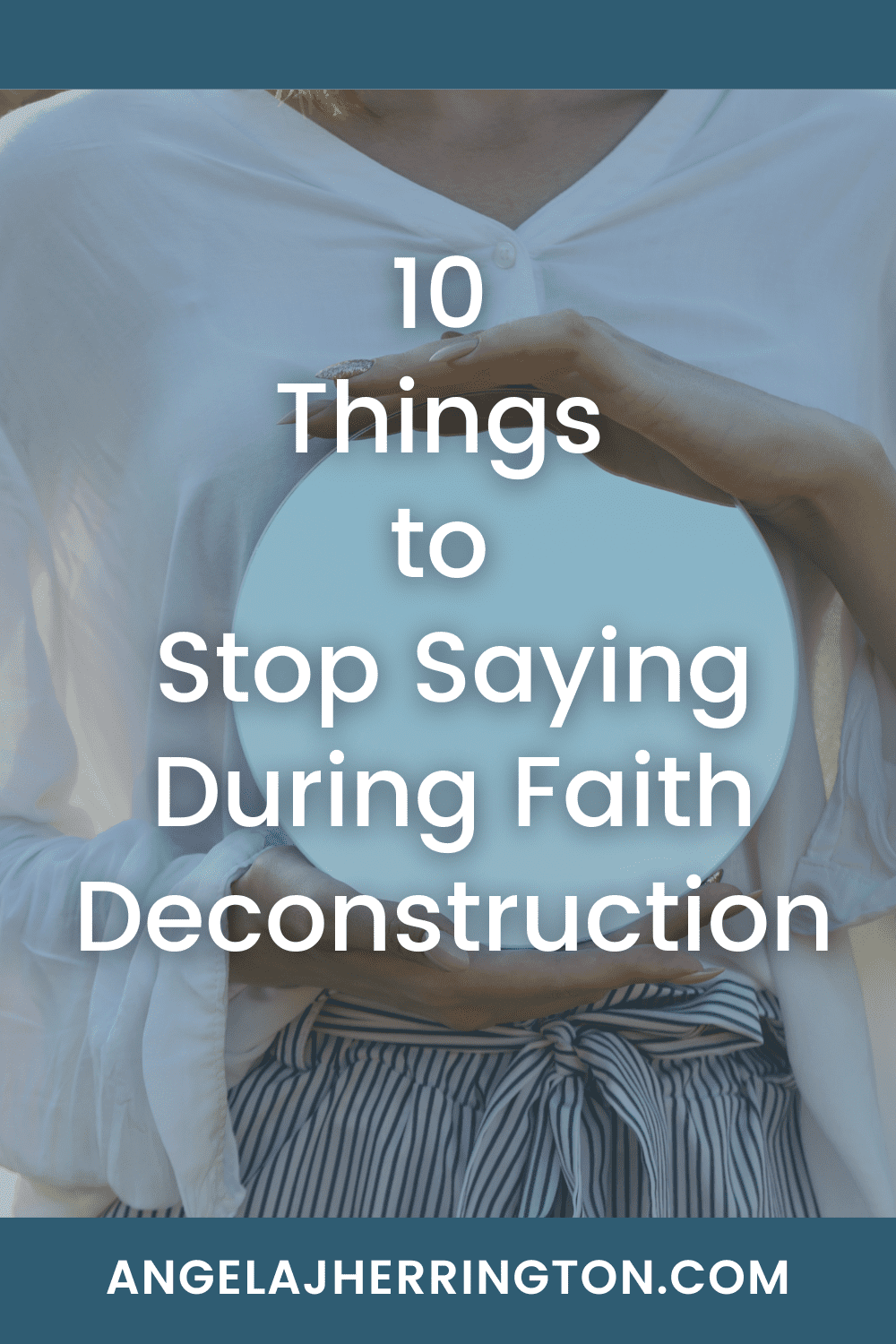
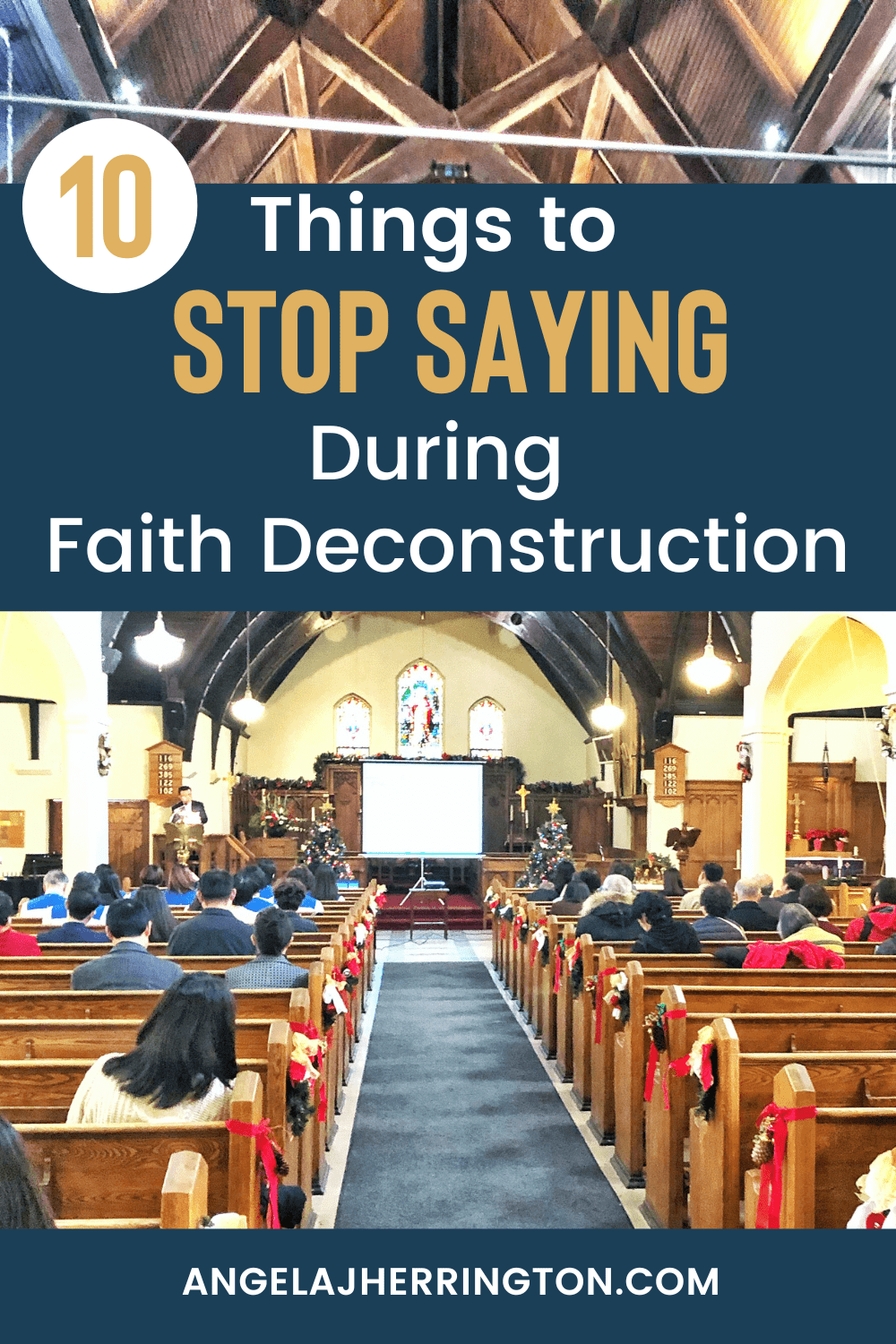
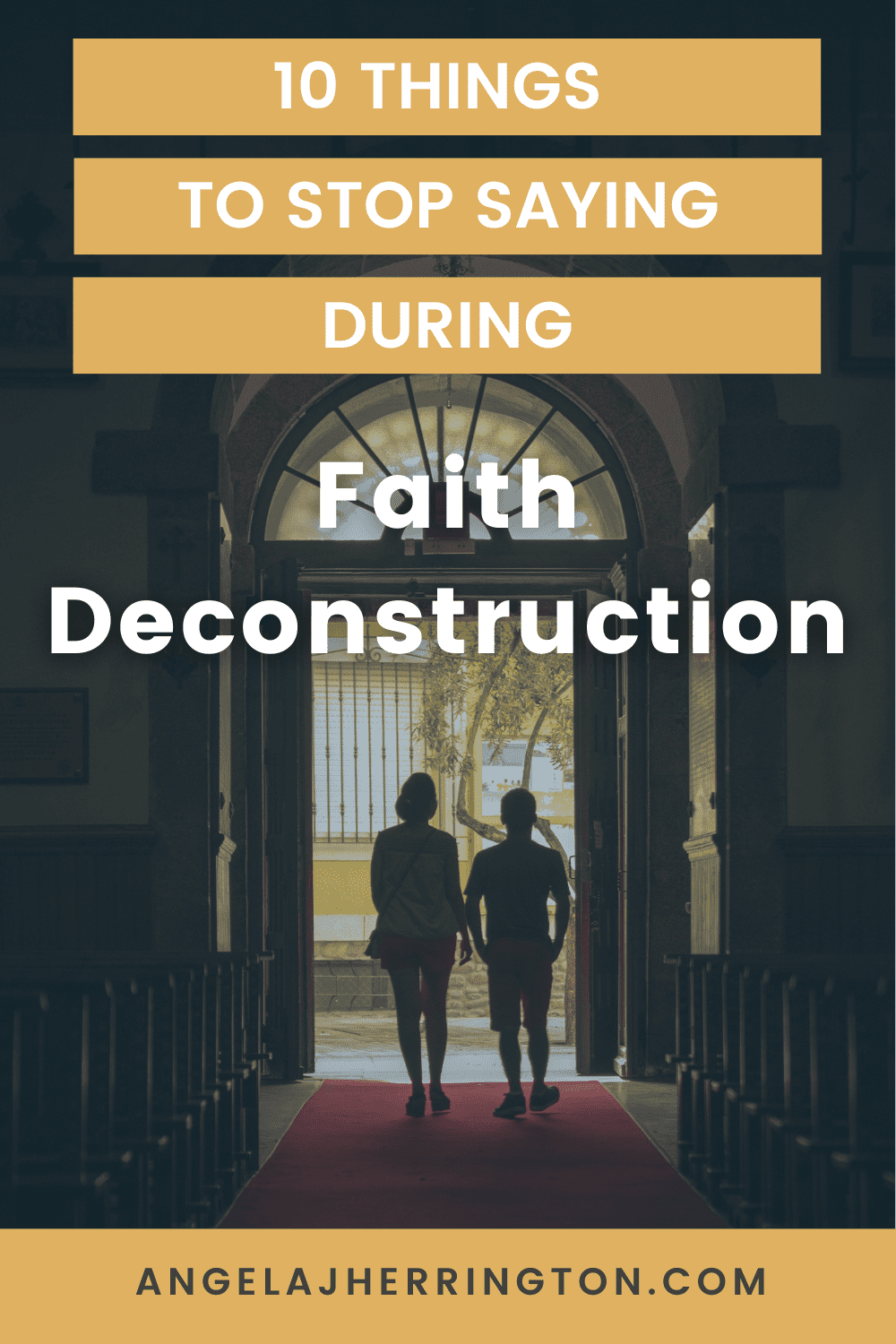
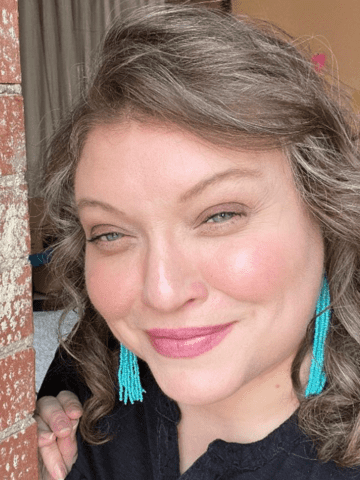
Angela is a Faith Deconstruction Coach and host of The Deconstructing Faith Summit who helps people break free from toxic religious culture & empowers them to recover from #churchhurt. She has led online ministries for a decade, enjoys working with clients 1:1, in groups, and is a dynamic conference speaker. She’s a Lark’s Song Certified Life Coach who reaches thousands of people in 40+ countries each month on Facebook, IG, Twitter, Pinterest, and her blog.
She’s a firstborn, Enneagram 8, Gen Xer who loves to question everything. She holds a BA from Indiana Wesleyan and a Masters in Leadership from Wesley Seminary. Her graduate research project focused on leadership development and opportunities for Gen X women in the US church.
Angela and her unique online ministry are featured in Lyz Lenz’s 2019 book God Land: Story of Faith, Loss, and Renewal in Middle America. She has published articles in Hope for Women and HOPE is Now magazines. She has been featured in The New Republic, Publisher’s Today, and Religion News Service.
Her first book, Deconstructing Your Faith Without Losing Yourself, Will be published by Eerdmans in February 2023.
Angela is also a wife, mom to 5, and a proud resident of Marion, Indiana with her family when they’re not traveling the US in their RV.
